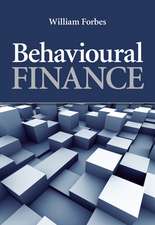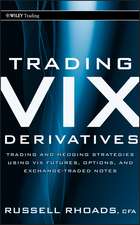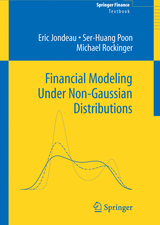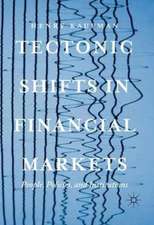Behavioral Interactions, Markets, and Economic Dynamics: Topics in Behavioral Economics
Editat de Shinsuke Ikeda, Hideaki Kiyoshi Kato, Fumio Ohtake, Yoshiro Tsutsuien Limba Engleză Hardback – 24 sep 2015
| Toate formatele și edițiile | Preț | Express |
|---|---|---|
| Paperback (1) | 659.70 lei 6-8 săpt. | |
| Springer – 23 aug 2016 | 659.70 lei 6-8 săpt. | |
| Hardback (1) | 666.41 lei 6-8 săpt. | |
| Springer – 24 sep 2015 | 666.41 lei 6-8 săpt. |
Preț: 666.41 lei
Preț vechi: 784.01 lei
-15% Nou
Puncte Express: 1000
Preț estimativ în valută:
127.51€ • 133.50$ • 105.51£
127.51€ • 133.50$ • 105.51£
Carte tipărită la comandă
Livrare economică 05-19 aprilie
Preluare comenzi: 021 569.72.76
Specificații
ISBN-13: 9784431555001
ISBN-10: 4431555005
Pagini: 690
Ilustrații: XVIII, 669 p. 87 illus., 6 illus. in color.
Dimensiuni: 155 x 235 x 43 mm
Greutate: 1.14 kg
Ediția:1st ed. 2016
Editura: Springer
Colecția Springer
Locul publicării:Tokyo, Japan
ISBN-10: 4431555005
Pagini: 690
Ilustrații: XVIII, 669 p. 87 illus., 6 illus. in color.
Dimensiuni: 155 x 235 x 43 mm
Greutate: 1.14 kg
Ediția:1st ed. 2016
Editura: Springer
Colecția Springer
Locul publicării:Tokyo, Japan
Public țintă
ResearchCuprins
Part I Intergenerational Interactions.- 1 An equilibrium model of child maltreatment (Akabayashi).-2 Tough Love and Intergenerational Altruism (Bhatt, Ogaki).- Part II Behavioral Macroeconomics.-3 Consumer interdependence via reference groups (Hayakawa, Venieris, Yiannis).- 4 Bounded rationality, social and cultural norms, and interdependence via reference groups (Hayakawa) .- 5 Keeping one step ahead of the Joneses: Status, the distribution of wealth, and long run growth (Futagami, Shibata, Akihisa).- 6 Macroeconomic implications of conspicuous consumption: A Sombartian dynamic model (Yamada).- 7 On Persistent Demand Shortages: A behavioural Approach (Ono, Ishida).-Part III Time Preference in Macroeconomics.- 8 Rate of Time Preference, Intertemporal Elasticity of Substitution, and Level of Wealth (Ogaki, Atkeson).- 9Economic development and time preference schedule: The Case of Japan and East Asian NICs(Ogawa).- 10 Luxury and Wealth (Ikeda, Shinsuke).- 11 On decreasing marginal impatience (Hirose, Ikeda).- Part IV Bubbles and Crash.- 12 Why Did the Nikkei Crash? Expanding the Scope of Expectation Data Collection (Shiller, Kon-Ya, Tsutsui).- 13 Price Bubbles Sans Dividend Anchors: Evidence from Laboratory Stock Markets (Hirota, Sunder, Shyam).- Part V Experimental Markets.- 14 Revenue Non-Equivalence between the English and the Second-Price Auctions: Experimental Evidence (Soo Hong, Nishimura).- 15 An experimental test of a committee search model(Hizen, Kawata, Sasaki).- 16 Equilibrium refinement vs. level-k analysis: An experimental study of cheap-talk games with private information (Kawagoe, Takizawa).-Part VI Behavioral Contract Theory.- 17 Moral Hazard and Other-Regarding Preferences(Itoh).- 18 Contracting with self-esteem concerns(Ishida).- 19 Optimal Promotion Policies with the Looking‐Glass Effect(Ishida).-Part VII Market Efficiency and Anomalies.- 20 Is No News Good News? The Streaming News Effect on Investor Behavior Surrounding Analyst Stock RevisionAnnouncement (Azuma, Okada, Hamuro).- 21 The Winner-Loser Effect in Japanese Stock Returns(Kato, Iihara, Tokunaga).- 22 Addition to the Nikkei 225 Index and Japanese market response: Temporary demand effect of index arbitrageurs(Okada, Isagawa, Fujiwara).- 23 The Calendar Structure of the Japanese Stock Market: The ‘Sell in May Effect’ versus the ‘Dekansho-bushi Effect'( Sakakibara, Yamasaki, Okada).
Notă biografică
Editors
Shinsuke Ikeda is a professor at the Institute of Social and Economic Research (ISER), Osaka University and serves as the director of the Research Centre of Behavioral Economics in ISER. He got a B.Com. of Kobe University in 1980 and a Ph.D. (Doctor) of Osaka University (economics) in 1997. He was the former president of the Association of Behavioral Economics and Finance. He published articles on behavioral economics, macroeconomic dynamics and asset pricing in Journal of Finance, Journal of Health Economics, Journal of International Economics, Journal of Monetary Economics, International Economic Review, etc. His work on behavioral economics is incorporated into the book Economics of Self-Destructive Choices, Springer, to appear in 2015.
Hideaki Kiyoshi Kato is a professor of finance at Graduate School of Economics, Nagoya University, Nagoya, Japan. Before joining Nagoya University, he taught at Kobe University. He received his Ph.D. degree from the University of Utah in 1985. He has published several books and more than 30 articles in the leading finance journals such as Review of Financial Studies, Management Science, Journal of Financial Economics, Journal of Financial and Quantitative Analysis, International Review of Finance, Japan and the World Economy, Pacific Basin Finance Journal, Journal of Portfolio Management, Journal of Financial Research, Journal of Banking and Finance, and Journal of Futures Markets on subjects including the market efficiency and anomalies, stock options, investor behavior, dividend policy, equity offerings, and stock index futures. He is currently an associate editor of Pacific Basin Finance Journal and International Review of Finance.
Fumio Ohtake is Osaka University distinguished professor and a professor in the Institute of Social and Economic Research at Osaka University and an executive vice president of Osaka University. He earned his M.A. and a Ph.D. from OsakaUniversity in 1985 and 1996, respectively and a B.A. from Kyoto University in 1983. He is the president of the Association of Behavioral Economics and Finance, and an executive director of the Japanese Economic Association. His research topics are behavioral economics, labor economics, income distribution and household behavior. He is also a recipient of the 2005 Nikkei Prize for Excellent Books in Economic Science; the 2005 Suntory Prize for Social Science and Humanities; the 2005 Economist Prize; the 2006 Ishikawa Prize of the Japanese Economic Association; and the 2008 Japan Academy Prize.
Yoshiro Tsutsui is a professor of economics at Konan University. He had previously taught at Nagoya City University and Osaka University. He was awarded a Ph.D. (economics) from Osaka University. He was the first president of the Association of Behavioral Economics and Finance and the president of Japan Society of Monetary Economics. His primary areas of teaching and research are behavioral economics and banking and finance. Currently, his research includes happiness study, time discounting, international linkage of stock prices and regional banking and finance. His publications appeared in Review of Economics and Statistics, Journal of Financial and Quantitative Analysis, Journal of Banking and Finance, Journal of Risk and Uncertainty, Regional Science and Urban Economics and Journal of Research in Personality. In 1988, his book, The Financial Markets and Banking Industry: Economic Analysis of Industrial Organization (Toyokeizai-Shinpo Sha, in Japanese) was awarded the Nikkei Prize for Excellent Books in Economic Science.
Shinsuke Ikeda is a professor at the Institute of Social and Economic Research (ISER), Osaka University and serves as the director of the Research Centre of Behavioral Economics in ISER. He got a B.Com. of Kobe University in 1980 and a Ph.D. (Doctor) of Osaka University (economics) in 1997. He was the former president of the Association of Behavioral Economics and Finance. He published articles on behavioral economics, macroeconomic dynamics and asset pricing in Journal of Finance, Journal of Health Economics, Journal of International Economics, Journal of Monetary Economics, International Economic Review, etc. His work on behavioral economics is incorporated into the book Economics of Self-Destructive Choices, Springer, to appear in 2015.
Hideaki Kiyoshi Kato is a professor of finance at Graduate School of Economics, Nagoya University, Nagoya, Japan. Before joining Nagoya University, he taught at Kobe University. He received his Ph.D. degree from the University of Utah in 1985. He has published several books and more than 30 articles in the leading finance journals such as Review of Financial Studies, Management Science, Journal of Financial Economics, Journal of Financial and Quantitative Analysis, International Review of Finance, Japan and the World Economy, Pacific Basin Finance Journal, Journal of Portfolio Management, Journal of Financial Research, Journal of Banking and Finance, and Journal of Futures Markets on subjects including the market efficiency and anomalies, stock options, investor behavior, dividend policy, equity offerings, and stock index futures. He is currently an associate editor of Pacific Basin Finance Journal and International Review of Finance.
Fumio Ohtake is Osaka University distinguished professor and a professor in the Institute of Social and Economic Research at Osaka University and an executive vice president of Osaka University. He earned his M.A. and a Ph.D. from OsakaUniversity in 1985 and 1996, respectively and a B.A. from Kyoto University in 1983. He is the president of the Association of Behavioral Economics and Finance, and an executive director of the Japanese Economic Association. His research topics are behavioral economics, labor economics, income distribution and household behavior. He is also a recipient of the 2005 Nikkei Prize for Excellent Books in Economic Science; the 2005 Suntory Prize for Social Science and Humanities; the 2005 Economist Prize; the 2006 Ishikawa Prize of the Japanese Economic Association; and the 2008 Japan Academy Prize.
Yoshiro Tsutsui is a professor of economics at Konan University. He had previously taught at Nagoya City University and Osaka University. He was awarded a Ph.D. (economics) from Osaka University. He was the first president of the Association of Behavioral Economics and Finance and the president of Japan Society of Monetary Economics. His primary areas of teaching and research are behavioral economics and banking and finance. Currently, his research includes happiness study, time discounting, international linkage of stock prices and regional banking and finance. His publications appeared in Review of Economics and Statistics, Journal of Financial and Quantitative Analysis, Journal of Banking and Finance, Journal of Risk and Uncertainty, Regional Science and Urban Economics and Journal of Research in Personality. In 1988, his book, The Financial Markets and Banking Industry: Economic Analysis of Industrial Organization (Toyokeizai-Shinpo Sha, in Japanese) was awarded the Nikkei Prize for Excellent Books in Economic Science.
Textul de pe ultima copertă
This book collects important contributions in behavioral economics and related topics, mainly by Japanese researchers, to provide new perspectives for the future development of economics and behavioral economics. The volume focuses especially on economic studies that examine interactions of multiple agents and/or market phenomena by using behavioral economics models. Reflecting the diverse fields of the editors, the book captures broad influences of behavioral economics on various topics in economics. Those subjects include parental altruism, economic growth and development, the relative and permanent income hypotheses, wealth distribution, asset price bubbles, auctions, search, contracts, personnel management and market efficiency and anomalies in financial markets. The chapter authors have added newly written addenda to the original articles in which they address their own subsequent works, supplementary analyses, detailed information on the underlying data and/or recent literature surveys. This will help readers to further understand recent developments in behavioral economics and related research.
Caracteristici
Collects for the first time works on behavioral economics/finance by representative Japanese authors Adds and expounds original supplementary data on related research and recent advances for all topics Covers a broad range of topics from behavioral economics to finance and from preferences to happiness Includes supplementary material: sn.pub/extras

















